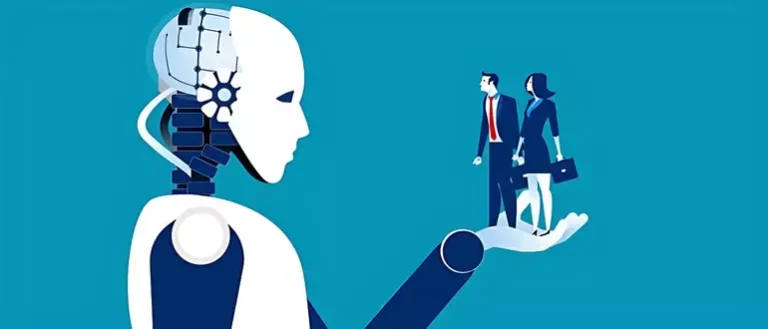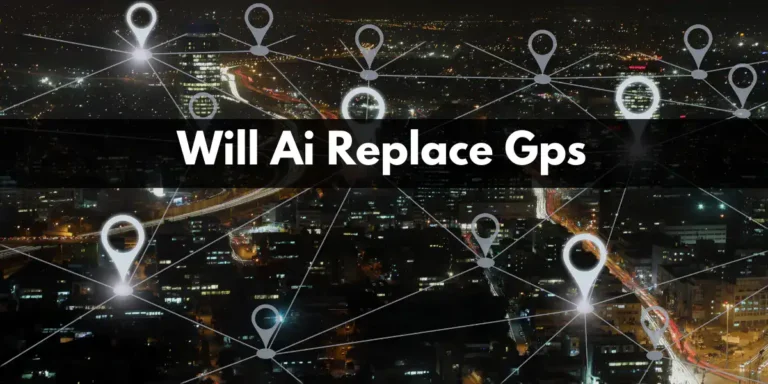Every day Artificial Intelligence (AI) grows from human-imputed data and becomes more sophisticated.
Digital marketing is one of several sectors being transformed by artificial intelligence (AI), an innovative technology.
People often ponder if artificial intelligence will someday completely replace human digital marketers.
This blog post will examine the impact of AI on the digital marketer’s job industry, provide predictions about the direction of digital marketing, and also discuss the benefits and limitations of AI in this sector.
Will AI Replace Digital Marketers?
No, AI will not replace digital marketers completely, at least not yet. Digital marketing requires imagination, creativity, and originality in communicating with clients, which AI lacks.
While AI can assist in data-driven decision-making and provide insights, human marketers are essential in creating and executing strategies that truly connect with and engage the audience.
How Can AI Improve The Targeting Of Audiences In Digital Marketing?
Personalized Messaging:
One of the most significant advantages of AI in digital marketing is the ability to create personalized messaging.
AI can analyze data to determine what content resonates with the audience, and businesses can then create personalized messages that speak directly to them.
This personalized approach not only enhances the customer experience but also increases engagement and conversion rates.
Predictive Analytics:
AI can also help businesses predict what their audience wants before they even know it themselves.
By analyzing data, AI can identify patterns and trends that can help businesses create more effective marketing campaigns.
Predictive analytics can also help businesses identify potential customers, allowing them to target them with relevant content and offers.
Real-Time Optimization:
Digital marketing campaigns are constantly evolving, and businesses need to be able to adapt quickly to stay ahead of the competition.
With AI, businesses can optimize their marketing campaigns in real-time, allowing them to make changes and adjustments as needed.
Real-time optimization can help businesses maximize their ROI and ensure that their marketing campaigns are as effective as possible.
What Are The Potential Impacts Of AI In The Digital Marketing Job Industry?
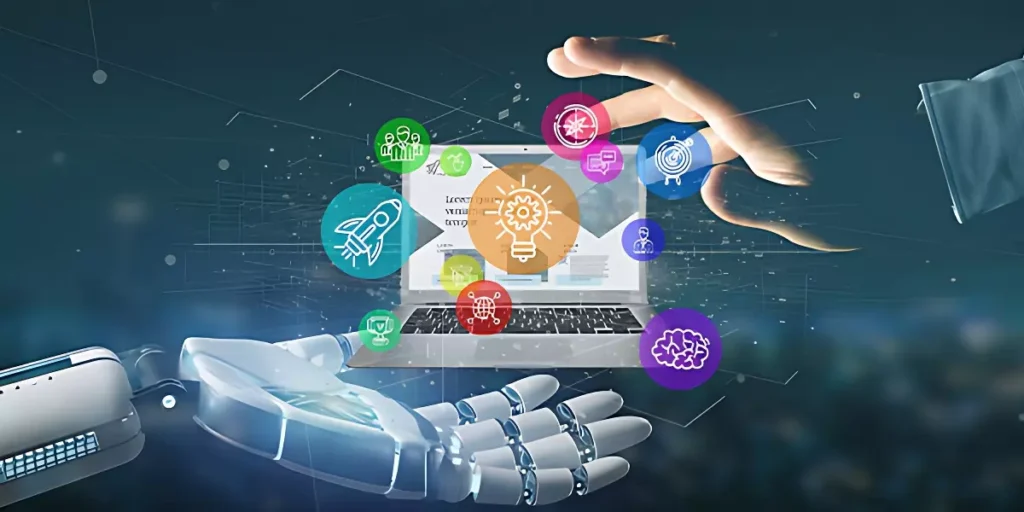
Increased Efficiency and Productivity:
One of the primary impacts of AI on the digital marketing job industry is increased efficiency and productivity.
AI-powered tools can automate routine tasks such as data entry, analysis, and reporting, which frees up marketers to focus on higher-level tasks such as strategy development and creative work.
This not only saves time but also reduces the risk of human error, resulting in better overall outcomes.
Improved Personalization:
Personalization is becoming increasingly important in digital marketing, and AI can help marketers to achieve this at scale.
By analyzing customer data, AI can help to identify patterns and behaviors that enable marketers to deliver more relevant and personalized experiences to their customers.
This not only enhances the customer experience but also improves the effectiveness of marketing campaigns.
Enhanced Targeting:
AI-powered tools can also help marketers to target their campaigns more effectively. By analyzing customer data, AI can identify specific segments of the audience that are most likely to respond to a particular message or offer.
This enables marketers to create more targeted campaigns that are more likely to resonate with their audience.
Better Insights:
Data is at the heart of digital marketing, and AI can help marketers to make more informed decisions by providing deeper insights into customer behavior and preferences.
AI-powered tools can analyze large volumes of data and identify patterns and trends that may not be immediately apparent to humans.
This enables marketers to optimize their campaigns and make data-driven decisions that drive better outcomes.
Changing Roles and Skillsets:
As AI becomes more prevalent in the digital marketing job industry, the roles and skillsets required by marketers are also changing.
Marketers need to be able to work with AI-powered tools and understand how to analyze and interpret the data they provide.
This requires a combination of technical and analytical skills, as well as an understanding of customer behavior and preferences.
What Skills Can Marketers Develop To Stay Competitive In The Digital Marketing Job Industry?
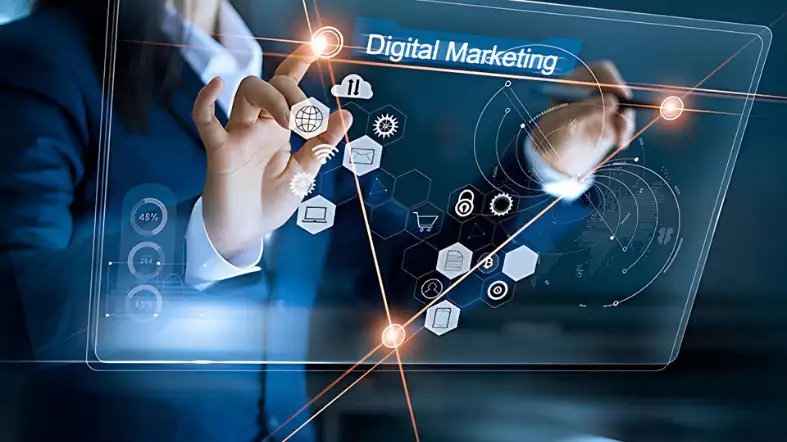
Data Analysis
One of the most important skills for digital marketers is data analysis. In today’s digital world, there’s a massive amount of data available to marketers.
The ability to analyze and interpret this data is essential to making informed decisions.
This includes not only understanding data but also being able to present it in a clear and concise way to others.
Tools like Google Analytics and Data Studio can help you get started with data analysis.
SEO (Search Engine Optimization)
SEO is another critical skill for digital marketers. SEO involves optimizing websites, blog posts, and other content to rank higher in search engine results pages (SERPs). This can drive more traffic to your website and ultimately lead to more conversions.
Understanding how search engines work, as well as the latest best practices for SEO, is essential to success in digital marketing.
Content Marketing
Content marketing is all about creating valuable content that engages your target audience.
This can include blog posts, videos, social media posts, and more. Content marketing aims to build brand awareness, establish thought leadership, and ultimately drive conversions.
To succeed in content marketing, you need to have strong writing skills, develop a content strategy, and understand how to measure the effectiveness of your content.
Social Media Marketing
Social media is a critical component of any digital marketing strategy. Platforms like Facebook, Instagram, and Twitter allow you to reach a massive audience and engage with them in real time.
To be successful in social media marketing, you need to have a deep understanding of each platform, be able to create compelling content, and know how to measure the impact of your social media campaigns.
PPC (Pay-Per-Click) Advertising
PPC advertising is paying for advertisements to show up at the top of social media platforms or search engine results on pages.
This can be a highly effective way to drive traffic to your website and generate leads.
To succeed in PPC advertising, you need to have a deep understanding of the platforms you’re advertising on, create compelling ad copy, and know how to measure the ROI of your campaigns.
How Can Digital Marketers Embrace AI And Use It To Complement Human Skills?
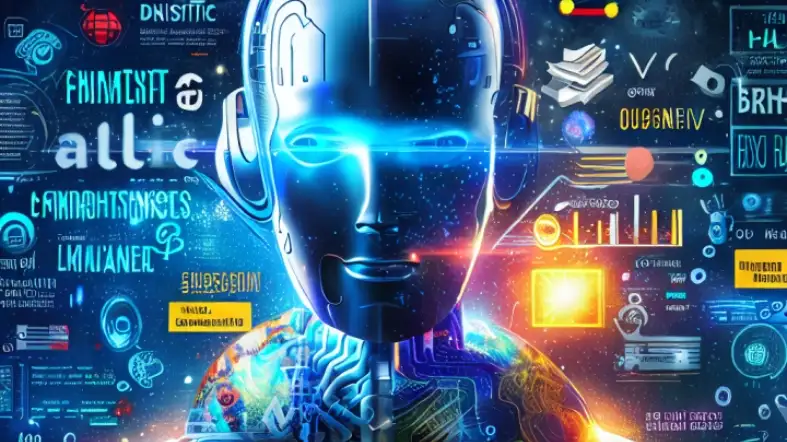
Automate routine tasks:
One of the most significant benefits of AI is that it can automate repetitive tasks, freeing up time for marketers to focus on more strategic activities.
For example, AI-powered tools can send personalized emails to customers, create and manage social media posts, and optimize ad campaigns based on customer behavior.
Use AI to understand customer behavior:
AI can analyze large amounts of data to gain insights into customer behavior and preferences.
This information allows marketers to develop more personalized marketing campaigns that resonate with their audience.
AI-powered tools can track and analyze customer interactions across multiple channels, such as social media, email, and website visits, to understand customer behavior.
Implement chatbots:
Chatbots are a great example of how AI can complement human skills in marketing.
Chatbots can be programmed to answer common customer questions, provide product recommendations, and even make purchases.
By implementing chatbots, marketers can offer 24/7 customer support, and free up time for more strategic tasks.
Use AI for predictive analytics:
AI can help you predict customer behavior, which can be used to inform marketing strategies.
Predictive analytics can help you identify customers who are most likely to purchase, which products are likely to be popular, and which marketing campaigns are most effective.
Using AI for predictive analytics can optimize your marketing efforts and increase ROI.
Combine AI and human skills:
While AI can be a powerful tool in marketing, it is important to remember that it is not a replacement for human skills.
To get the most out of AI, combining it with human skills such as creativity, empathy, and strategic thinking is essential.
By working collaboratively with AI, marketers can create more effective campaigns that resonate with their audience.
What Are The Benefits Of Using AI In Digital Marketing?
Personalization:
AI can analyze a vast amount of customer data, including browsing history, purchase behavior, and social media activity, to provide personalized recommendations and content.
This can include personalized emails, product recommendations, and targeted advertising.
By tailoring the customer experience to each individual, companies can increase customer satisfaction and loyalty.
Improved Customer Engagement:
AI-powered chatbots and virtual assistants can provide immediate responses to customer inquiries, 24/7.
This not only improves customer satisfaction but also frees up staff time for more complex tasks, such as customer retention and relationship building.
Chatbots can also help companies engage with customers on multiple platforms, including social media and messaging apps.
Predictive Analytics:
AI can analyze customer data to identify patterns and trends, which can be used to predict future behavior and opportunities.
This can include predicting which customers are most likely to make a purchase, which products are likely to be popular, and which channels will be most effective for reaching different customer segments.
With predictive analytics, companies can make data-driven decisions and optimize their marketing strategies for maximum ROI.
Cost-Effective:
AI can automate many of the repetitive and time-consuming tasks involved in digital marketing, such as data analysis and lead scoring.
This reduces costs and improves efficiency, allowing marketing teams to focus on high-level strategic planning and creative initiatives.
AI can also help companies identify areas of waste and inefficiency, allowing them to allocate resources more effectively.
Improved ROI:
By analyzing customer data and adjusting campaigns in real time, AI algorithms can improve the performance of digital marketing campaigns.
This can include optimizing ad placement, adjusting messaging, and targeting specific customer segments.
By improving campaign performance, companies can achieve better results and maximize their ROI.
Enhanced Customer Retention:
AI can help companies improve customer retention by providing personalized recommendations and content.
This can include personalized emails, product recommendations, and loyalty programs.
By tailoring the customer experience to each individual, companies can increase customer satisfaction and loyalty, reducing churn and improving customer lifetime value.
What Are The Limitations Of AI In Digital Marketing?
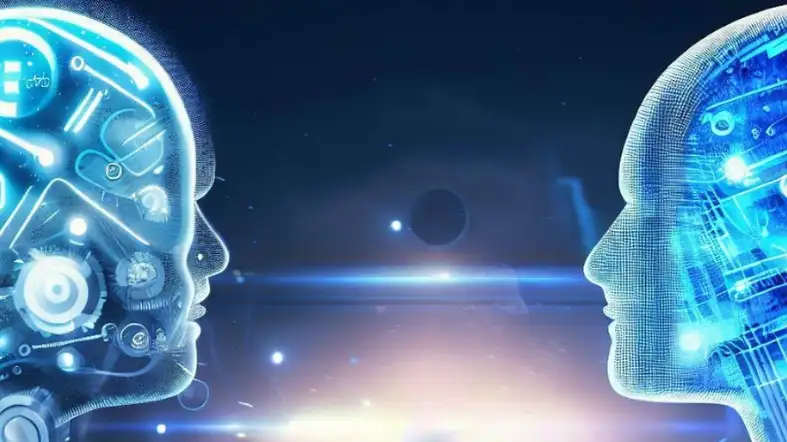
Limitation #1: Lack of Human Touch
One of the biggest limitations of AI in digital marketing is its lack of human touch.
While AI can analyze data and make predictions based on patterns and trends, it cannot empathize with customers like humans can.
This means that it may not always be able to understand the nuance and context of a customer’s needs, leading to ineffective communication and messaging.
Limitation #2: Limited Creativity
AI is great at processing large amounts of data and identifying patterns, but it lacks the creative abilities of a human marketer.
It can’t come up with new and innovative marketing strategies on its own or think outside the box when it comes to campaign execution.
While AI can assist with data analysis and decision-making, it still requires human input to create compelling and engaging marketing campaigns.
Limitation #3: Biased Data
AI is only as good as the data it’s trained on; if the data is biased, the results will also be biased.
In digital marketing, this means that AI may perpetuate stereotypes or discrimination if it’s not properly programmed and trained.
It’s crucial to ensure that the data used to train AI is diverse and representative to avoid perpetuating harmful biases.
Limitation #4: Technical Glitches
Despite its advanced capabilities, AI is not immune to technical glitches and errors. This can be a significant issue in digital marketing, where even small errors can have a big impact on campaign performance.
It’s essential to have a backup plan in place in case of technical issues and regularly monitor AI systems to ensure they run smoothly.
Limitation #5: Limited Understanding of Context
AI is excellent at analyzing data and identifying patterns, but it may not always be able to understand the context in which that data exists. This can lead to misguided recommendations or ineffective messaging.
It’s essential to have human oversight to ensure that AI recommendations align with your overall marketing strategy and brand voice.
FAQs
What Is The Role Of AI In Digital Marketing?
AI has the potential to revolutionize digital marketing by automating repetitive tasks, providing data-driven insights, and improving personalization for customers.
Can AI Completely Replace Digital Marketers?
No, AI cannot completely replace digital marketers as there are many aspects of marketing that require human creativity, intuition, and empathy.
AI can assist marketers in their work, but it cannot replace the human touch.
What Are Some Examples Of How AI Is Currently Used In Digital Marketing?
AI is currently used in digital marketing for tasks such as chatbots, personalized recommendations, predictive analytics, and automated email campaigns.
How Does AI Improve The Customer Experience?
AI can improve the customer experience by providing personalized recommendations based on customer data, providing instant customer service through chatbots, and improving the overall customer journey through data-driven insights.
Will AI Make Digital Marketing More Or Less Expensive?
AI has the potential to make digital marketing more efficient, which can lead to cost savings for businesses.
However, the implementation of AI technology can be expensive initially, and ongoing maintenance may also require additional resources.
Conclusion
AI will not replace digital marketers anytime soon. While AI has the ability to automate certain tasks, it lacks the creativity and empathy that human marketers possess.
Additionally, the human touch is crucial in building authentic relationships with customers. As technology advances, marketers will need to adapt and embrace
AI as a tool to enhance their work, rather than fearing it as a threat to their jobs.
The future of digital marketing is a collaboration between humans and AI, working together to create powerful, personalized campaigns.

